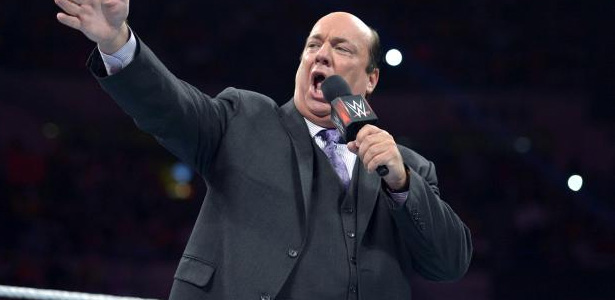
I just cracked open an AMP energy drink when I jumped online to listen to some old Howard Stern clips before I planned to continue working on the “Ryse At Ringside” series that I’m writing for the Ryse Wrestling Patreon page since the group is on standby for live events during the pandemic. I’ve really enjoyed reflecting on my commentary ventures with the organization while I’m writing the content it. None of this is directly relevant to when I saw Paul Heyman trending on Twitter, except for the fact that I knew immediately that my planned writing session would have to wait because either Heyman had possibly flipped a chair and stormed out of the company or he was simply shifted out of his role as lead writer of Monday Night Raw. Thankfully, it was the latter and presumably we will still see the leader of extreme on our TV screens again soon because he still cuts the best promo in the company and arguably the entire business.
I see this as a major story because it’s less of an indication of the standing of Heyman, who certainly had his ups and downs in the promotion over the years, and more of a revealing aspect of the structure of the publicly traded company. The big shake-up was less than a year ago when it was announced in July of 2019 that Heyman, the longtime booker of ECW and former writer of Smackdown in the early-2000s, would takeover as the lead writer for Raw, the brand where he cut money promos for the past several years alongside Brock Lesnar. At the same time, Eric Bischoff, the former WCW Vice President and the only one to ever put Vince McMahon on the ropes, was hired to head the creative team on Smackdown, a show that was scheduled to move to the Fox Network in a matter of months as a part of WWE’s massive new TV deals. There was speculation at the time that Bischoff, who touted himself more as a TV executive than a wrestling guy, was hired for his role as a way to work with the suits at Fox.
Whatever the reason, Bischoff’s tenure last roughly three months, as he was abruptly fired in October of last year, just weeks after the previously mentioned Fox debut. Some speculated that Bischoff was simply the fall guy for when the Smackdown ratings took a noticeable dip in the weeks after the debut. Other online chatter claimed that Bischoff was rather disconnected from the production of the show and difficult to find when the show was scheduled to air. All things considered, the former WCW kingpin probably didn’t get a fair shot in the role on the Smackdown writing team, and it was definitely convenient that he was there to get the axe so that WWE brass could tout changes in an attempt to improve numbers on the conference call with it’s stockholders. Again, to be fair, Bischoff, if he had a plan of action for the blue brand, didn’t really get a chance to put it in motion with just three months to try to implement that strategy. The fact that WWE publicly announced his dismissal, the same way they had previously touted the hiring, gives the impression that it was more to serve the shareholders than anything else.
While Bischoff’s hiring was to pay lip service to Fox executive the same way his firing was lip service to stockholders, Heyman’s departure from the writing team is different in what it means for the product as well as what is says about the company. Make no mistake about it, Eric Bischoff had tremendous success during the Monday Night wars, but it was within a relatively short time. In truth, Bischoff didn’t have an extended track record for success, which isn’t a jab at him, but rather to point out, he was less a wrestling booker and more of a TV executive, which has more of a focus on the branding on a product than the weekly angles. However, Paul Heyman has the extensive experience of booking a company and the track record to prove that he can create stars.
Don’t get me wrong, Raw hasn’t been stellar the past few months, but it’s difficult to judge it because the lack of any audience for most of that time created a completely sterile environment. On the flip side, there were a few bright spots with the presentation of Andrade, Garza, and others. The problem is, considering that Vince McMahon still has final approval on anything before it makes air, it’s difficult to tell how much of Heyman’s concept makes it to TV. Raw ratings have continued to decline during the pandemic and it could be a matter of the lack of a live crowd just takes most of the energy away from the viewing experience. That being said, since Heyman had less than a year in the role as head writer, it appears that he will take the fall for the sluggish numbers in the past few months.
The problem here is two-fold because the changes within the creative team indicate a lack of any long term plan, and ultimately rebuilding the audience is a process as the characters and angles on the show are built to give them a reason to tune into the show. The sudden changes to either alter the perception of the product or draw a quick boost in the numbers for a week or two are proof that management is searching for an answer to the ratings decline. The scattered booking leads to a fragmented product that doesn’t connect with the audience. The second half of the equation is that as mentioned Vince McMahon still decides what makes it on-screen so essentially, the “change in direction” still isn’t necessarily a new philosophy. Make no mistake about it, Vince is an entertainment baron and the best wrestling promoter in the history of the industry, the fact that his company is worth roughly a billion dollars proves that. At the same time, just because he made a lot of the right calls in the past doesn’t automatically mean that he will make the right calls now.
Does that mean that the next boom period will arrive if Vince suddenly decides to retire to an island stocked with Icopro bars? Absolutely not, if anything, for all it’s rightful criticism, the WWE brand is the foundation of the professional wrestling industry in the United States, and Vince’s incredible work ethic is what kept the foundation steady. The point being, clearly the current ideology of sports entertainment doesn’t connect with the fans and until there’s a shift in philosophy from either Vince or someone he allows the chance to completely book the shows then the product will probably remain stagnant.
As repetitive as it is, I have to say it again, the lack of competition is ultimately what led to a level of mediocrity and complacency within the company.
When Stone Cold got over as the top guy, the WWF has to run with him because they had to use whatever worked to compete against WCW. When there’s not truly competition for viewers, the corporate agenda, not the fan demand is what dictates the direction of the product. If CM Punk could’ve walked out of the WWE and onto Nitro in 2011, would the company have done almost everything they could to minimize his star power at that point? Would the fans have to completely reject the entire product for Daniel Bryan to get a chance, if WCW could’ve theoretically been an option? Between Brock Lesnar and Roman Reigns, how many other stars didn’t get a chance to truly get over as much as they could with the audience? Obviously, Brock is a draw, but there was opportunity cost when Lesnar and Reigns were the primary focus of the company.
According to the WWE’s statement, Bruce Prichard, who worked for the company for years before he left in 2008 and returned in recent years, is the new lead writer for both Raw and Smackdown. Prichard, who started in Houston under Paul Boesch, has worked nearly his entire life in the wrestling business, with much of that time spent as one of McMahon’s top advisors. Essentially, Bruce is a Vince McMahon protege with much of the same philosophy as his boss. This isn’t meant as a negative towards him because he might be able to bring something fresh to the product, but I don’t think he’s going to attempt to book anything that is too far outside of the usual Vince McMahon playbook, which is exactly the reason the product is stale so it’s doubtful that he’s the answer to the decline in ratings. I think it’s fair to say that perhaps the WWE machine churns out too many content and spreads its roster too thin because the in-ring talent is there, but how effective those talents are presented is debatable. WWE’s statement also said that Heyman will remain an on-screen character so if nothing else, he has a less stressful role in the company and can show up occasionally to cut money promos for Lesnar. Considering the path for Bischoff and Heyman, you have to wonder, will Prichard eventually be the next executive to take the blame for the ratings?
What do you think? Comment below with your thoughts, opinions, feedback and anything else that was raised.
Until next week
-Jim LaMotta
E mail [email protected] | You can follow me on Twitter @jimlamotta







